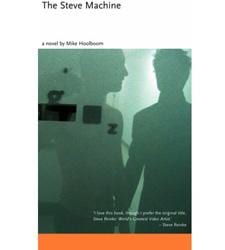Award-winning Toronto film and video artist Mike Hoolboom opens his first novel with a tube-tanned doctor delivering bad news. “There was a sadness in this doctor’s face that remained a stranger to him, and it kept him young.” Flashes of this kind of incisiveness recur throughout the book. Two paragraphs later Auden, our narrator, describes the weird numbness that can settle in when mortality hits us in the chops. “I felt the muscles in my face as a large pack of steel balls that needed to be coaxed and herded to form basic human responses.” Who of us has not been there?
Auden quickly decides that Sudbury is too small to handle his big news. The only place to really live with HIV is Toronto. He throws some clothes into a backpack and exits his basement apartment for the last time. A five block walk almost exhausts him, adding to his newly dissociative relationship with the world: “I pretended to continue walking to the bus station until it was there in front of me. I impersonated a ticket purchase, a man waiting on the seat, a person who enjoyed lineups.” Toronto’s Bay St terminal proves to have “the same kicked-dog look of every bus depot in the world.” He buys a paper, circles some apartment listings and heads to a bank of pay phones.
As he builds his new urban life Auden’s story is reliably fiction, until at a friend’s funeral he meets the object of his instant fascination: real-life video artist Steve Reinke, still in the early years of his career. Within moments Reinke has booked him for a writing project, on the surface a bio of Reinke, but actually “a kind of operating manual for a machine that he had spent his life perfecting.” Auden is profoundly struck by Reinke’s speaking voice, as if it has always belonged inside his head. It’s the inner voice he hears whenever he reads, now “leapt into the mouth of this stranger.”
These are the pre-cocktail years in Toronto. With limited treatment options Auden is losing friends to AIDS almost as quickly as he can make them. Hoolboom evokes the cascade of loss succinctly, without any sense of rehashing the iconic urban plague novels of the period. With the arrival of Reinke the story plunges into serious arty-conceptual territory, as Auden becomes a sort of acolyte-stenographer for Reinke’s recitation of his artistic past, always intimately connected to his personal life. Part of this is clearly the real life (including a swath of actual text from one of The Hundred Videos, Reinke’s first major work) but Hoolboom freely blends fact with fiction, among other things slotting Reinke into an imaginary role in the Toronto reality show The Lofters. Meanwhile, Auden’s inner voice feels to him more and more like Steve’s. “I was becoming part of the machine.”
Plot-wise the story often moves as much sideways as forward. Some of the drift leads us repeatedly into petty sparring between Auden and his boss at an insurance office. The job-related sections never really connect with the main body of the story — which itself feels pretty random.
The climax that Hoolboom has been fitfully tugging us toward comes in the hours and days after a second test result. Here his artful dodges give way to stark honesty. We’re dropped casually, but with rivetting effect, into the emotional labyrinths of our varied inner responses to AIDS. In tight snatches of groping, painfully real dialogue, almost no twist of mind and gut is left untouched. Fear, confusion, shame, regret, tenderness, a search for hope, finally a macabre sense of irony — as if, says Auden, Steve’s habitual TV-sitcom laugh had suddenly “grown teeth.”
The Steve Machine is finally about taking care of our collective selves, which to Hoolboom seems mostly to be about pushing our way through the stigma of HIV and making safe sex more important than fear of rejection. Disclosure — the issue that lately seems to be twisting too many HIV discussions into impenetrable Gordian knots — is lightly passed over. Hoolboom’s message couldn’t be stronger or simpler, and is hardly new: We need to commit, for real, to looking out for each other, positive and negative, on equal terms.

 Why you can trust Xtra
Why you can trust Xtra


